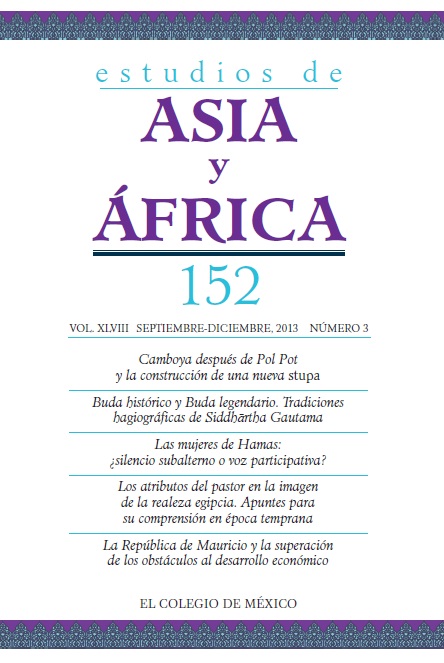Abstract
The Republic of Mauritius enjoys welfare levels much higher than the average Subsaharan African country in spite of the fact that, when it became an independent country, it exhibited some of the features that have inhibited economic growth and poverty alleviation in other African countries. In this paper we focus on the way that Mauritius overcame three of these hurdles: i) a very heterogeneous population in ethnic and religious terms, that in other African countries has caused divisions and clashes and retarded economic development, ii) an economy extremely dependent on sugar and its by-products, and iii) the existence of propitious conditions for the spread of several diseases, in particular malaria.
References
Acemoglu, D., S. Johnson y J. A. Robinson, An African Success Story: Botswana, Documento de discusión, núm. 3219, Londres, Centre for Economic Policy Research, febrero, 2002.
African Development Bank-Organization for Economic Cooperation and Development, African Economic Outlook, 2004-2008.
African Development Bank-Organization for Economic Cooperation and Development-United Nations Development Program-United Nations Economic Commission for Africa, African Economic Outlook, 2011.
African Development Bank-Organization for Economic Cooperation and Development-United Nations Development Program-United Nations Economic Commission for Africa, African Economic Outlook. Mauritius, 2011.
Benedict, B., Mauritius: problems of a plural society, Nueva York, Institute of Race Relations, 1965.
Brautigan, D., “Institutions, Economic Reform, and Democratic Consolidation in Mauritius”, Comparative Politics, vol. 30, núm. 1, 1997, pp. 45-62.
Bridgman, B., “Why are Ethnically Divided Countries Poor?”, Journal of Macroeconomics, vol. 30, núm. 1, 2008, pp. 1-18.
Bunwaree, S., “Reversing the Decline-smallness and Human Capital in Mauritius”, ponencia presentada en el World Forum on Small Island Developing States, 10-13 de enero de 2005.
Bunwaree, S., “The Marginal in the Miracle: Human Capital in Mauritius”, International Journal of Educational Development, vol. 21, núm. 3, 2001, pp. 257-271.
Carroll, B. W. y T. Carroll, “Accommodating Ethnic Diversity in a Modernizing Democratic State: Theory and Practice in the Case of Mauritius”, Ethnic and Racial Studies, vol. 23, núm. 1, 2000, pp. 120-142.
Carroll, B. W. y T. Carroll, “The Consolidation of Democracy in Mauritius”, Democratization, vol. 6, núm. 1, 1999, pp. 179-197.
Carroll, B. W. y S. K. Joypaul, “The Mauritian Senior Public Service. Some Lessons for Developing and Developed Nations”, International Review of Administrative Sciences, vol. 59, núm. 3, 1993, pp. 423-440.
Collier, P., The Political Economy of Ethnicity, Documento de trabajo, núm. 98-8, Oxford, Center for the Study of African Economies, 1998, pp. 1-14.
Darga, L. A. y G. D. Joomun, Strengthening Parliamentary Democracy in SADC Countries. Mauritius Country Report, Braamfontein, The South African Institute of International Affairs, 2005.
Easterly, W., “Can Institutions resolve Ethnic Conflict?”, Economic Development and Cultural Change, vol. 49, núm. 4, 2001, pp. 687-706.
Easterly, W. y R. Levine, “Africa’s Growth Tragedy: Policies and Ethnic Divisions”, Quarterly Journal of Economics, vol. 12, núm. 4, 1997, pp. 1203-1250.
Frankel, J., Mauritius: African Success Story, Documento de trabajo, núm. 16569, Cambridge, National Bureau of Economic Research, 2010.
Gallup, J. L. y J. Sachs, “The Economic Burden of Malaria”, American Journal of Tropical Medicine and Hygiene, vol. 64, núm. 1 (Suplemento), 2001, pp. 85-96.
Mathur, R., “Parliamentary Representation of Minority Communities: The Mauritian Experience”, Africa Today, vol. 44, núm. 1, 1997, pp. 61-82.
Meade, J. et al., The Economics and Social Structure of Mauritius – Report to the Government of Mauritius, Londres, Methuen, 1961.
Mehrothra, S., “Education for All: Policy Lessons from High-Achieving Countries”, International Review of Education, vol. 44, núm. 5-6, 1998, pp. 461-484.
Posner, D., “Measuring Ethnic Fractionalization in Africa”, American Journal of Political Science, vol. 48, núm. 4, 2004, pp. 849-863.
Roberts, J. L., “Malaria Control in Mauritius”, en Africa Environment Outlook Case Studies. Human Vulnerability to Environmental Change, Nairobi, United Nations Environment Program, 2004.
Rodrik, D., The New Global Economy and Developing Countries: Making Openness Work, Londres, Overseas Development Council, 1999.
Sandbrook, R., “Origins of the Democratic Developmental State: Interrogating Mauritius”, Canadian Journal of African Studies/Revue Canadienne des Études Africaines, vol. 39, núm. 3, 2005, pp. 549-581.
Subramanian, A., The Mauritian Success Story and its Lessons, Documento de investigación, núm. 36, Washington, United Nations University-World Institute for Development Economics Research, 2009.
Subramanian, A. y D. Roy, “Who can explain the Mauritian Miracle? Meade, Romer, Sachs, or Rodrik?”, en D. Rodrik (ed.), In Search of Prosperity. Analytic Narratives on Economic Growth, Princeton, Princeton University Press, 2003.
United Nations, The Millenium Development Goals Report 2007, Nueva York, UN, 2007.
United Nations, Human Development Report 2011. Sustainability and Equity: A Better Future for All, Nueva York, UN, 2011.
Varela, H., “Botswana: entre el autoritarismo liberal y la democracia”, en R. Cornejo (comp.), En los intersticios de la democracia y el autoritarismo: algunos casos de Asia, África y América Latina, Buenos Aires, Consejo Latinoamericano de Ciencias Sociales, 2006.
World Health Organization, World Malaria Report 2008, Ginebra, WHO, 2008.
This work is licensed under a Creative Commons Attribution-NonCommercial-NoDerivatives 4.0 International License
Copyright 2022 Estudios de Asia y África



